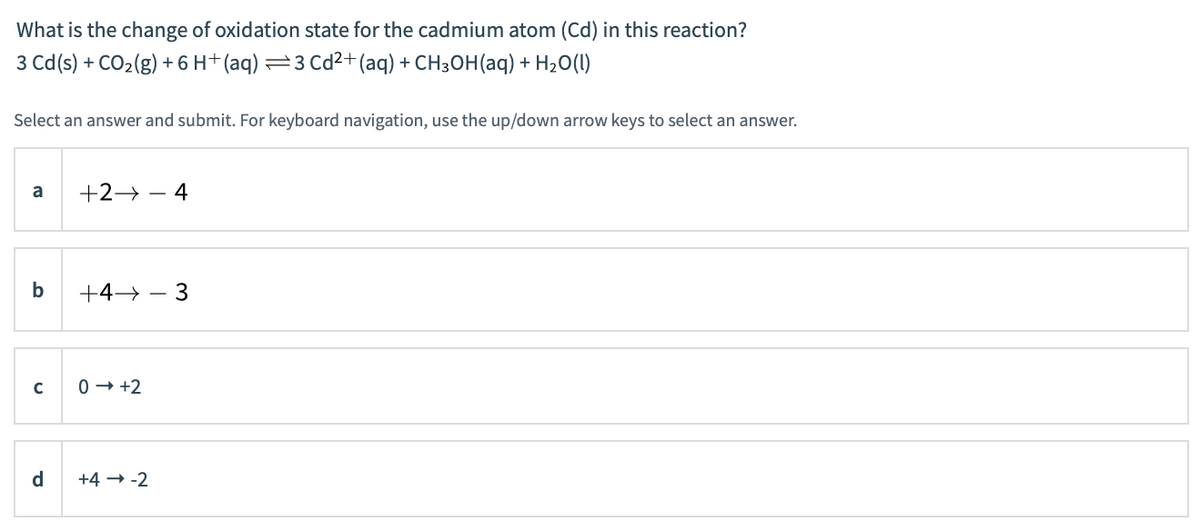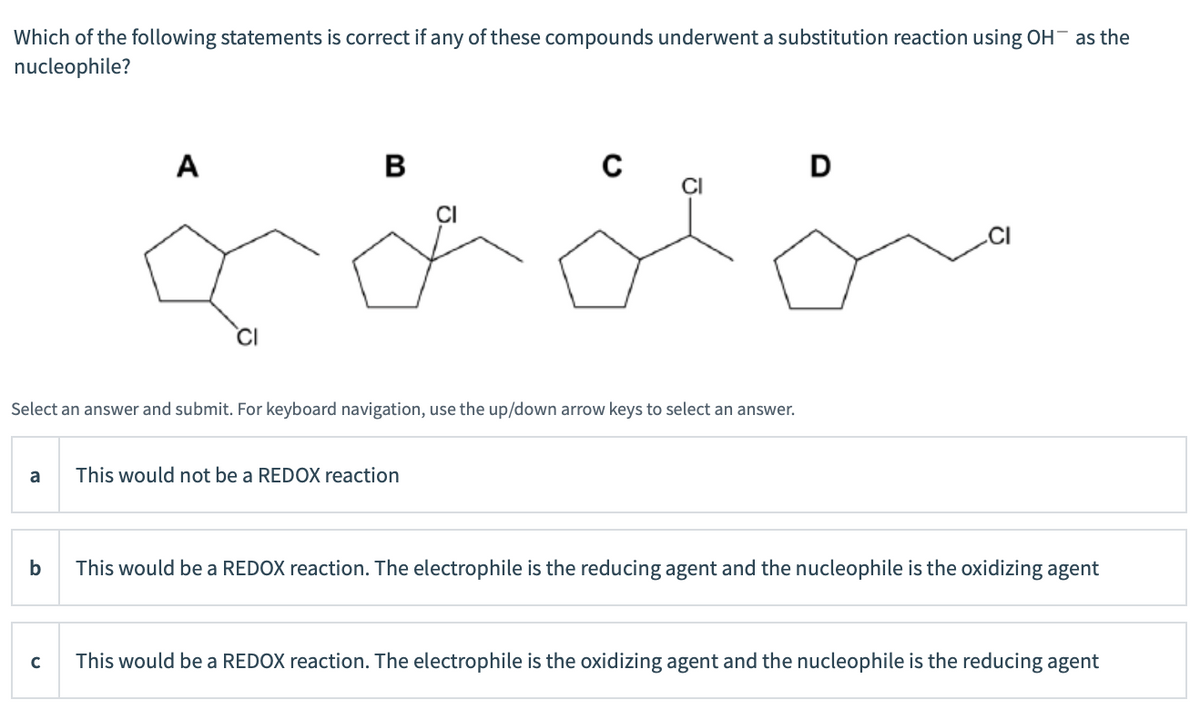What is the change of oxidation state for the cadmium atom (Cd) in this reaction? 3 Cd(s) + CO2(g) + 6 H+(aq) =3 Cd²+(aq) + CH3OH(aq) + H2O(I) Select an answer and submit. For keyboard navigation, use the up/down arrow keys to select an answer. a +2→ – 4 b +4→ – 3 0 - +2 d. +4 - -2
What is the change of oxidation state for the cadmium atom (Cd) in this reaction? 3 Cd(s) + CO2(g) + 6 H+(aq) =3 Cd²+(aq) + CH3OH(aq) + H2O(I) Select an answer and submit. For keyboard navigation, use the up/down arrow keys to select an answer. a +2→ – 4 b +4→ – 3 0 - +2 d. +4 - -2
Introductory Chemistry: A Foundation
9th Edition
ISBN:9781337399425
Author:Steven S. Zumdahl, Donald J. DeCoste
Publisher:Steven S. Zumdahl, Donald J. DeCoste
Chapter18: Oxidation–reduction Reactions And Electrochemistry
Section: Chapter Questions
Problem 105CP
Related questions
Question

Transcribed Image Text:What is the change of oxidation state for the cadmium atom (Cd) in this reaction?
3 Cd(s) + CO2(g) + 6 H+ (aq) =3 Cd²+(aq) + CH3OH(aq) + H2O(l)
Select an answer and submit. For keyboard navigation, use the up/down arrow keys to select an answer.
a
+2→ – 4
b
+4→
3
0 + +2
d
+4 → -2

Transcribed Image Text:Which of the following statements is correct if any of these compounds underwent a substitution reaction using OH as the
nucleophile?
A
В
D
CI
.CI
CI
Select an answer and submit. For keyboard navigation, use the up/down arrow keys to select an answer.
a
This would not be a REDOX reaction
b
This would be a REDOX reaction. The electrophile is the reducing agent and the nucleophile is the oxidizing agent
This would be a REDOX reaction. The electrophile is the oxidizing agent and the nucleophile is the reducing agent
Expert Solution
This question has been solved!
Explore an expertly crafted, step-by-step solution for a thorough understanding of key concepts.
Step by step
Solved in 3 steps

Knowledge Booster
Learn more about
Need a deep-dive on the concept behind this application? Look no further. Learn more about this topic, chemistry and related others by exploring similar questions and additional content below.Recommended textbooks for you

Introductory Chemistry: A Foundation
Chemistry
ISBN:
9781337399425
Author:
Steven S. Zumdahl, Donald J. DeCoste
Publisher:
Cengage Learning

Chemistry: Principles and Practice
Chemistry
ISBN:
9780534420123
Author:
Daniel L. Reger, Scott R. Goode, David W. Ball, Edward Mercer
Publisher:
Cengage Learning

Chemistry: The Molecular Science
Chemistry
ISBN:
9781285199047
Author:
John W. Moore, Conrad L. Stanitski
Publisher:
Cengage Learning

Introductory Chemistry: A Foundation
Chemistry
ISBN:
9781337399425
Author:
Steven S. Zumdahl, Donald J. DeCoste
Publisher:
Cengage Learning

Chemistry: Principles and Practice
Chemistry
ISBN:
9780534420123
Author:
Daniel L. Reger, Scott R. Goode, David W. Ball, Edward Mercer
Publisher:
Cengage Learning

Chemistry: The Molecular Science
Chemistry
ISBN:
9781285199047
Author:
John W. Moore, Conrad L. Stanitski
Publisher:
Cengage Learning

Chemistry
Chemistry
ISBN:
9781305957404
Author:
Steven S. Zumdahl, Susan A. Zumdahl, Donald J. DeCoste
Publisher:
Cengage Learning


Chemistry by OpenStax (2015-05-04)
Chemistry
ISBN:
9781938168390
Author:
Klaus Theopold, Richard H Langley, Paul Flowers, William R. Robinson, Mark Blaser
Publisher:
OpenStax